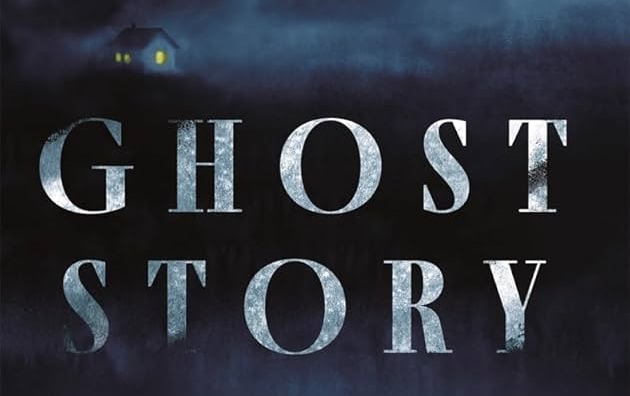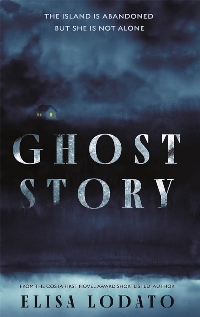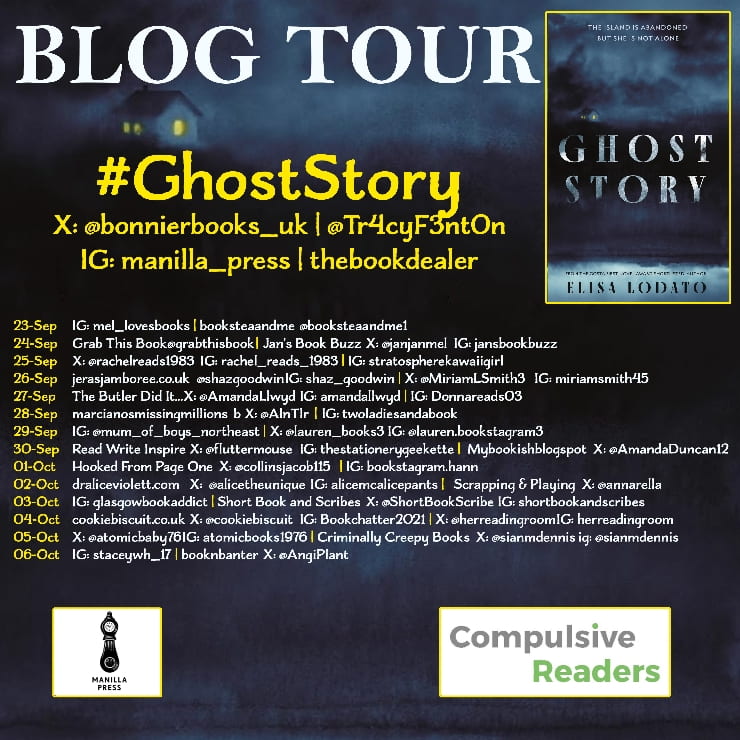Blog tour: Ghost Story by Elisa Lodato

This post is part of a blog tour organised by Compulsive Readers. I received a free copy of the book in return for an honest review.
‘The island is abandoned. But she is not alone…
‘Off the windswept coast of Scotland lies Finish Island, rugged and remote. Once a home, it now stands abandoned, a place of dark history and deep memory, a place that holds its stories close.
‘Unable to write since her daughter’s death, it’s here that Seren comes to work, hoping that the solitude and silence will inspire her next novel.
‘But the island holds memories of its own, restless and unwilling to stay buried. As unsettling occurrences become even more bizarre and frightening, Seren starts seeing uncanny resonances between her past and the island’s history.
‘There is something on this island, something ancient and unforgiving. Will Seren discover its secrets, before it’s too late?’

In Ghost Story, by Elisa Lodato, author Seren Doughty spends four months – from May to September – on the abandoned Outer Hebrides island of Finish. Her goal: to write a zeitgeisty island-based ghost story that will satisfy her publishers and sell well.
There’s a lot riding on this. Seren’s three-year-old daughter Tilly died in an arson attack along with Seren’s sister Alana six years previously, and understandably, Seren has struggled to move on.
Seren’s marriage to Tilly’s father Jamie couldn’t withstand the strain, and her last novel, which she wrote with reluctance when Tilly was a baby, was a total flop. Not only is she hoping to revive her writing career, but that being alone on the island will help her manage her grief.
Seren doesn’t end up quite as alone on Finish as she expected, however. For one thing, she develops a relationship with Daley, the good-looking boatman who transports day-trippers and supplies to the island during the summer months. Then there’s Alex, the intense young librarian she first met while doing preliminary research in Edinburgh, who turns up claiming to be collecting soil samples for his PhD.
But there’s also something less definable, which manifests as ghostly cries and inexplicable events…
I really liked Ghost Story, being particularly captivated by the eerie atmosphere that persists throughout the novel; the history adapted and attached to the fictional island; and the wry meta-ness in regard to writing and publishing.
The feeling of creepiness and unease is there even before Seren sets foot on Finish. From the start, you’re aware she’s not going to survive, so you’re on the alert for clues as to how she meets her demise.
There’s also the feeling she’s living a half-life following her catastrophic losses. Then she meets Alex, who at first could be excused as socially inept and pompous, but later teeters, then plunges, into red flag territory.
Staying in Castlebay the night before the boat crossing, Seren’s further unsettled by a couple of out-of-the-ordinary things she sees and hears. By the time she actually gets to Finish, we’re well-primed for spooky goings-on.
These phenomena are very skilfully woven into the story. Lodato doesn’t overplay her hand: incidents are few and far between (there are stretches where you almost forget about them, and find yourself enjoying an uplifting story about a woman rebuilding her life by living off-grid for a spell), Seren rationalises them when she’s the only witness, and when there’s someone else present, their corroboration helps you suspend your disbelief.
The history the author creates for Finish by blending imagination with mixed-and-matched stories of real Outer Hebridean islands enriches the phenomena with weight and meaning. As well as the islanders’ (pragmatic) abandonment of the island in 1912, Seren learns of a brutal massacre committed against the island’s men, women and children hundreds of years earlier, and the reverence the residents had for their midwife – particularly the woman who held this role at the time of the massacre, and was given the posthumous name of Chulainn (“warrior”).
Seren maps her supernatural experiences onto what she knows of Finish’s history but, being an author, has the self-awareness to recognise that she could be forcing these connections, and is filling in the blanks herself.
This is just one instance of the meta-ness I so appreciated in this book. Right from the opening pages, when Seren’s publishers are asking Jamie (as her bereaved next of kin) to send over her “manuscript” in the hope of working it up into something they can sell, you know you’re in for a clear-eyed, interesting take on the literary industry.
I felt like Lodato was giving me a mischievous wink as the characters in this island-based novel referred to how and why such books were “on-trend”, and when Seren, attempting to come up with a synopsis for the book she hadn’t started, wrote a sentence that could largely describe Ghost Story itself.
In fact, while some seriously dark and shocking events are described in this novel, there are also a number of opportunities to laugh – for example, at Alex’s terrible idea for his own novel, the obnoxious Canadian couple who insist on telling Seren their life story, and the trials of living in a bothy without indoor plumbing.
Ghost Story is multi-layered, atmospheric, and compellingly creepy.
